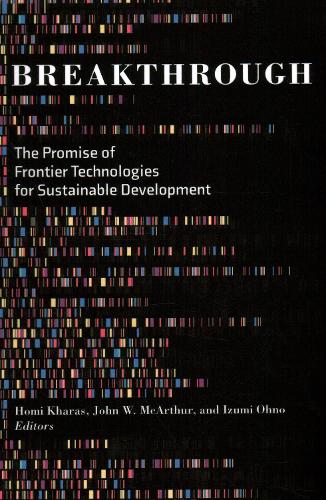
Breakthrough: The Promise of Frontier Technologies for Sustainable Development
(Paperback)
Publishing Details
Breakthrough: The Promise of Frontier Technologies for Sustainable Development
By (Author) Homi Kharas
Edited by John W. McArthur
Edited by Izumi Ohno
Bloomsbury Publishing PLC
Brookings Institution
25th January 2022
United States
Classifications
Professional and Scholarly
Non Fiction
Central / national / federal government policies
Political economy
Society and culture: general
338.927
Physical Properties
Paperback
256
Width 156mm, Height 224mm, Spine 17mm
372g
Description
One overall takeaway is that gradualist approaches will not achieve those goals by 2030. Breakthroughs will be necessary in science, in the development of new products and services, and in institutional systems. Each of the experts responded with stories that reflect big ambitions for what the future may bring. Their stories are not projections or forecasts as to what will happen; they are reasoned and reasonable conjectures about what could happen. The editors intent is to provide a glimpse into the possibilities for the future of sustainable development.
At a time when many people worry about stalled progress on the economic, social, and environmental challenges of sustainable development, Breakthrough is a reminder that the promise of a better future is within our grasp, across a range of domains. It will interest anyone who wonders about the worlds economic, social, and environmental future.
Reviews
Focusing on UN Sustainable Development Goals (SDGs)ending poverty, malnutrition, deforestation, and climate changeKharas, McArthur, and Ohno ask what key ingredients produce nonlinear breakthroughs. They argue that a gradualist approach will fail and that exponential progress comes only with better policy and politics as well as technology. The book's 12 chapters draw on more than a dozen authors with expertise in science, business, civil society, and policy making. Overall, they find that best practices for innovation include user-centered design, understanding the context and concerns of affected communities, smart risk-taking, designing for scale and sustainability from the start, and collaboration. Chapter 4 examines utility-scale solar power, finding it nearly free as costs lie with battery storage and metering rather than with the electrical power itself. Chapter 7 targets smallholder agriculture with the maxim "think big, act fast, start small" to help improve agronomic decisions regarding activities such as fertilizing, watering, and harvesting. Chapter 9 explores "smart cities" as more than just a venue for showcasing new technology, from transportation to utilizing sensors for collecting large data sets for AI analysis. Throughout, contributing authors rightly recognize that new breakthrough technologies risk primarily benefiting the world's wealthiest, further exacerbating inequities borne by poor and rural populations. Highly recommended. * Choice Reviews *
Author Bio
Homi Kharas is asenior fellow in the Center for Sustainable Development at the Brookings Institution, where he specializes in analyzing policies and finance in supportof sustainable development. His previous books include Leave No One Behind:Time for Specifics on the Sustainable Development Goals.
John W. McArthuris a senior fellow in, and Director of, the Center for Sustainable Development at the Brookings Institution. He co-chairs the 17-Rooms initiative, a newapproach to spurring action, insight, and community for the SustainableDevelopment Goals. His previous books include From Summits to Solutions:Innovations in Implementing the Sustainable Development Goals.
Izumi Ohno is a Professor at the NationalGraduate Institute for Policy Studies in Japan, and a Senior Research Adviserto the Japan International Cooperation Agency (JICA) Ogata Sadako ResearchInstitute for Peace and Development. She specializes in internationaldevelopment policy, industrial policy and Japanese development cooperation. Herprevious books include Industrial Human Resource Development in DevelopingCountries: Knowledge and Skills in the Era of SDGs.
